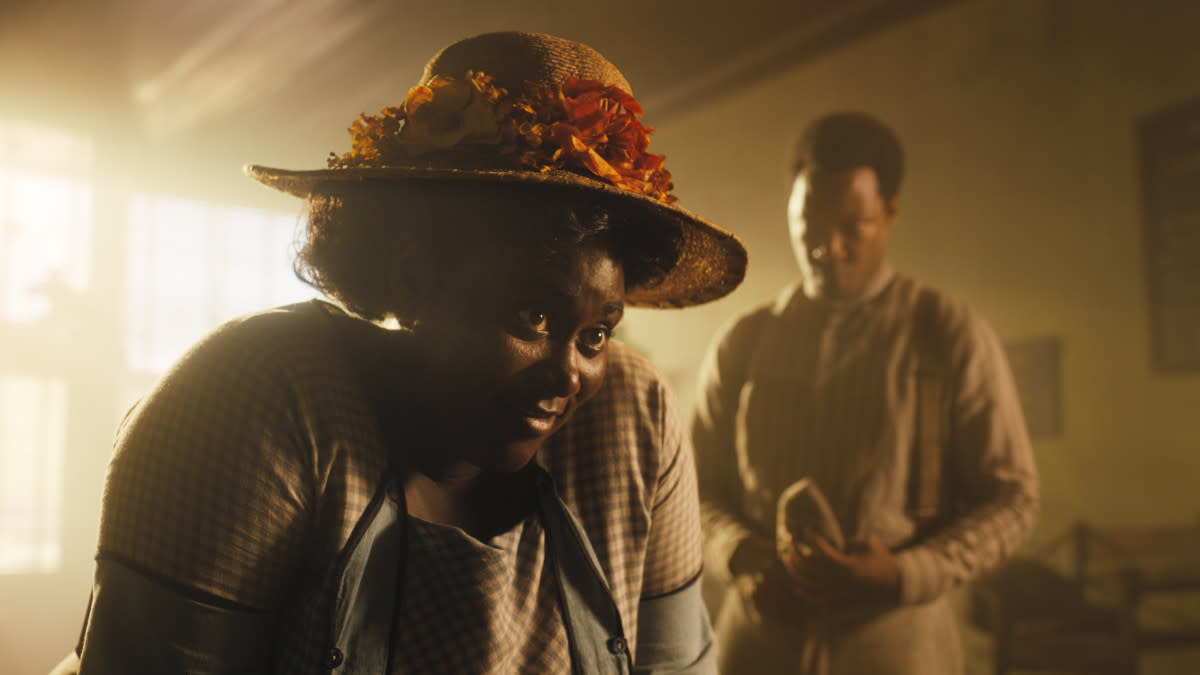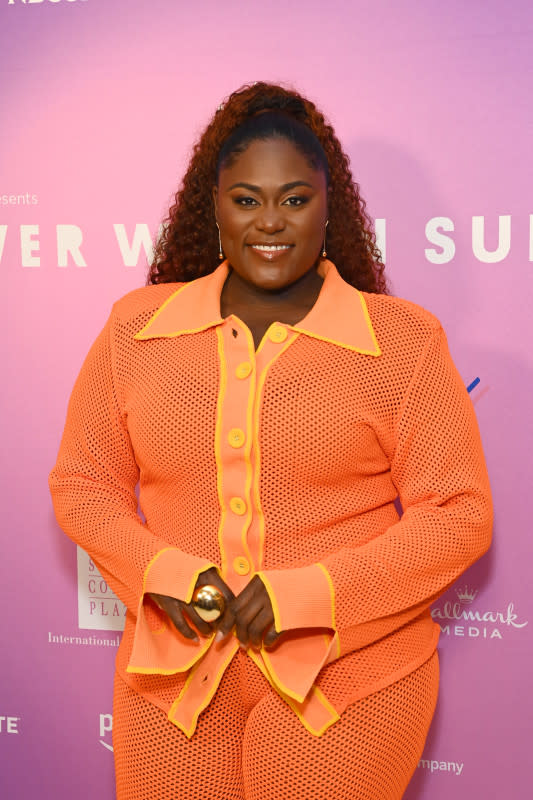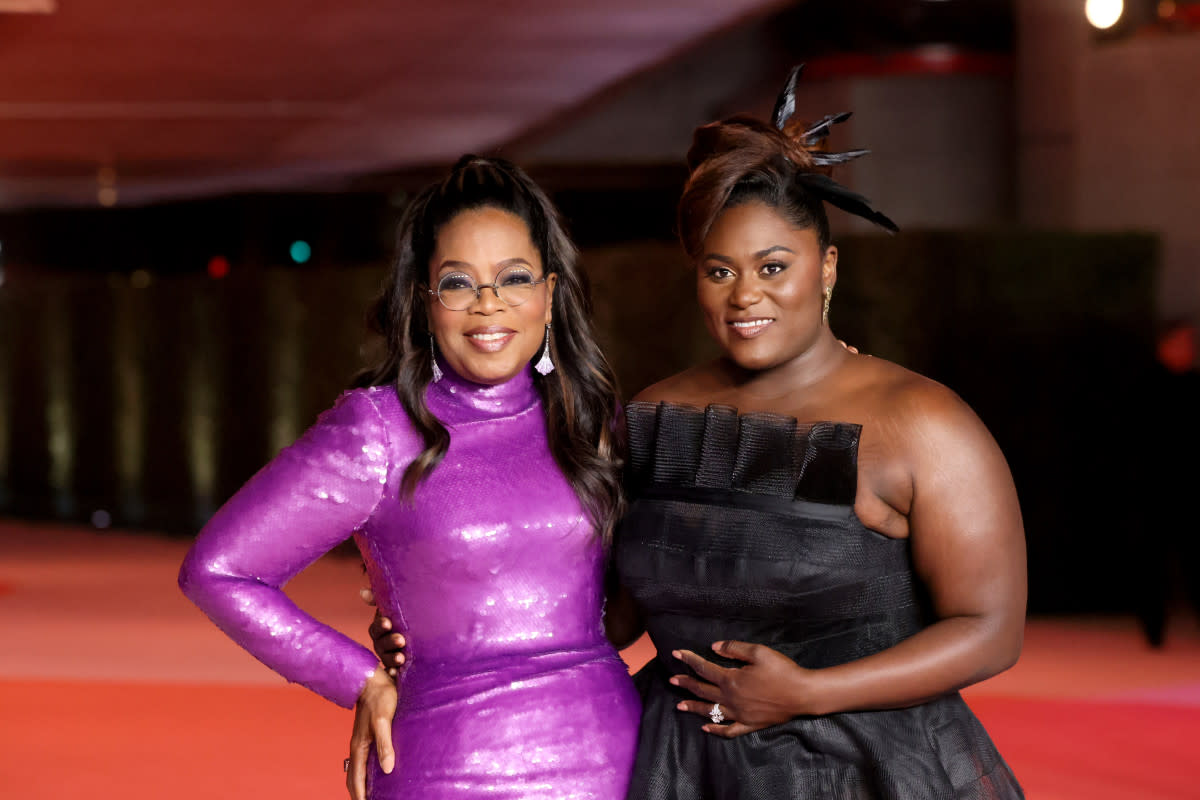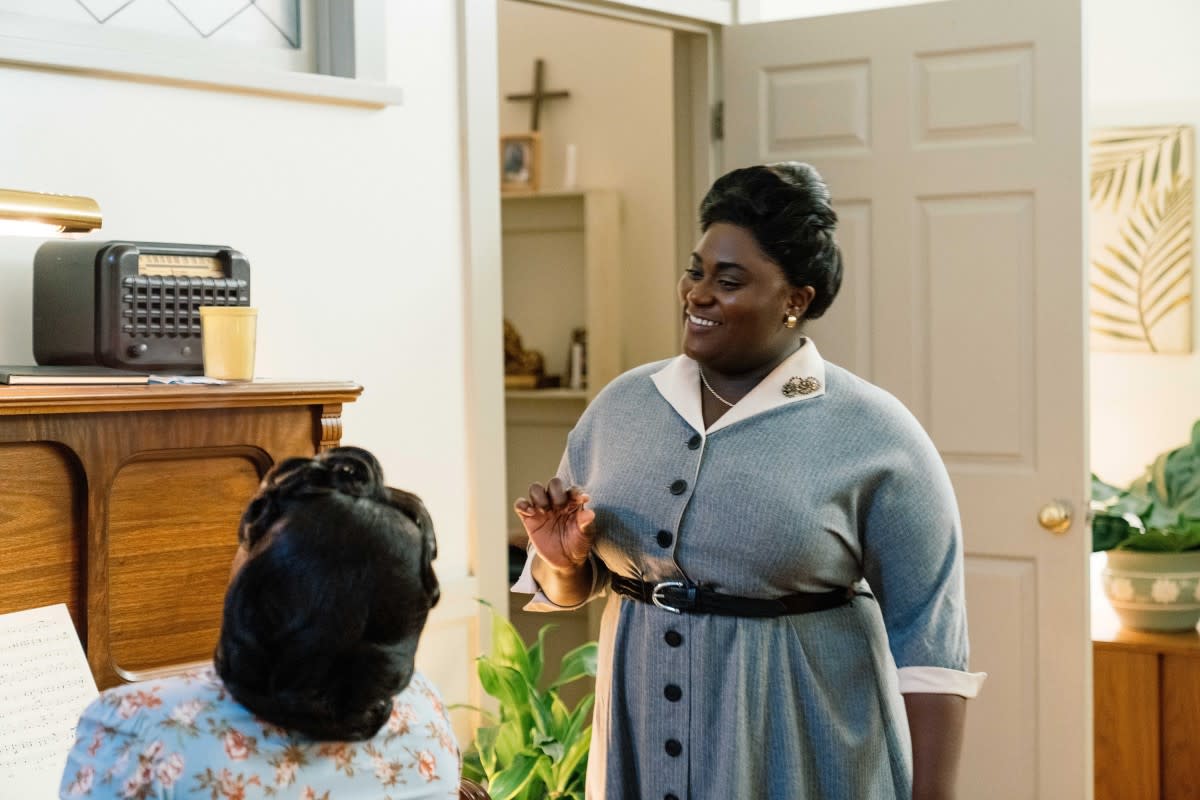Why 'The Color Purple' Star Danielle Brooks 'Longed for Guidance' From Oprah

Danielle Brooks
Danielle Brooks, the Orange Is the New Black star, 34, reprises the role of Sofia, for which she earned a Tony nomination on Broadway, in the updated movie version of The Color Purple (in theaters Dec. 25). The film employs a musical twist and a bold new take on the story of the sisterhood of Celie (Fantasia Barrino), Shug (Taraji P. Henson) and Sofia—three African American women in the South during the early 1900s—as they embark on a hope-filled journey to discover their voice, to find their joy, and to be true to their hearts and minds.
Parade sat down with Brooks to discuss moving the role from stage to screen, her work on Orange is the New Black and what's next for her.
Walter Scott: You’ve played the role of Sofia twice: in the Broadway revival and now in the film. How are the two different?
Danielle Brooks: There are huge changes. First, we’re dealing with two different mediums: theater and film. When I did the John Doyle [Broadway] production in 2015, we only had a wooden stage and wooden chairs. We, as the actors, truly had to use our imagination to bring the story to life. We were using bed sheets and swaddling them up to imagine babies in our hands. We didn’t really have a juke joint. We didn’t get a bunch of different costume changes and things like that. We had to imagine going to Africa with sheets that we raised up in the air and with lighting effects and things like that.
On the one hand, that was fun because that’s truly where all the exploration comes from using your imagination. And doing that eight shows a week for a year, I really got to do that, to tap into the core and the depth of who Sofia is. But then after all that exploration, all these years later, stepping into the film and actually being in Georgia where it’s set and being on a plantation shooting this film and riding in an old 1940 Ford vintage car…it just changes the game.
Also, to actually having a 10-pound baby, a real baby, in my hands that I have to make sure is safe and taken care of, it really adds a beautiful layer that I think helped me to take on Sofia and to find even more of her roots.

Getty Images
You sing one of the showstoppers, “Hell No.” Did you love the message of the song?
I think [director] Blitz Bazawule has found a beautiful way to lift and refresh the music. When we did “Hell No,” it is way more of an anthem for women. It’s one of those empowerment songs, like “I am woman, hear me roar” [Helen Reddy’s “I Am Woman”]. It’s really like that. Or like hearing Alicia Keys’ “Girl On Fire.” Or even Beyoncé’s “Run the World (Girls).”
I feel like women are going to be so inspired to say hell no to whatever they are dealing with in life. But, yeah, I feel like he just gave much more of a balance to the highs and lows of life. The audience does not have to sit through so much turmoil and watch so much suffering as we did in the original Steven Spielberg production. But you actually really get to lean into the joy and beauty of how these people are.
A lot of the church scenes, how it opens in the beginning, with this beautiful choir and dancers; you get to go to the juke joint and see all the fun and how they do the day-to-day, and you see the joy in Harpo’s [Corey Hawkins] eyes as he sings his work song building his house for his woman, Sofia. The film is just so much more lighthearted without losing why we are here at this story and what the conflict and problems are that women face.
Oprah played Sofia in the 1985 version of the film and she’s a producer on this one. What did you talk about with her?
We talked a lot and I’m so grateful that she was open to speaking with me. I think for myself, just her passing the baton over that Zoom call really gave me the sense that she was going to give me freedom to find and bring my own Sofia to this new adaptation, which was just so refreshing. I didn’t feel pressure to do it her way, but I really longed for guidance from her. I asked Scott Sanders, our other producer, if he would be so kind to get me on the phone with her to talk about the role. She shared so many of her own personal stories of when she first filmed this in 1985.
She also told me of this beautiful quote that Maya Angelou shared with her, “I come as one, but I stand as 10,000,” which really resonated with me because I feel that Sofia, Celie and Shug are standing in the gap for so many women that relate to them. It just reminded me of the responsibility that I had to give this character everything that I had, which was a lot, because this role is not easy at all to do. It's so heavy to go from light to dark in the way that Sofia is written. But I love a challenge.
Related: All About the 2023 Remake of 'The Color Purple'

Getty Images
You mentioned standing for the 10,000. It’s so applicable here because Sofia’s a woman before her time who refuses to kowtow, but she ends up paying for that in a very painful way.
That’s very interesting that you bring that up, because she is a woman ahead of her time. I think about women like Fannie Lou Hamer, who was fighting for the right to vote and had to go through the same thing of being sent to prison, beaten in prison as they tried to break her. I think what we’ve seen is that it’s necessary. Not the abuse, of course, but the fight. It’s so important to have women leaders who stand up and not take no mess the same way that Sofia did.
Sometimes we do have to have women stand in the gap for us in this country and in life. I hope women are left feeling empowered and like whatever battle that they feel like they need to fight, whether that’s gender equality or whether that’s more personal, fighting generational curses of abuse in their family, that they feel like they can do that. I’m excited to see what happens once this movie comes out when it comes to women. I’m not trying to get political because I’m not a political person, but we are coming into a political year. I just look forward to seeing how we as women position ourselves.
The legacy of The Color Purple is far reaching. It’s a story of forgiveness. Is that what you hope people take away from it?
Forgiveness and redemption and resilience; proud to be resilient and to not give up on life. I feel like each character has something that they are trying to offer us. I’m excited for people to find whatever they need through whatever character. Some people are going to be Misters [Colman Domingo], and some people are going to be Celies and Sofias and Harpos. That’s the whole point of what we do as art, is to be that reflection for people to see themselves and to hope that they will be able to change.
That’s why I’m excited, too, that we have the music this time around. That is something that we can always carry with us and put on our Spotify or however you get your music. You can just plug it into your ears and be reminded and find a song, whether that’s “Hell No,” or “I’m Here” or “The Color Purple (Reprise),” whatever that is you can lean into it again and find it again when you don’t have the time to watch a two-and-a-half-hour movie.
I’m excited about that because I know what this music has done for me and how it’s changed my life getting to be reminded that God is inside me, and everyone else. Those things stick with me. I’m excited for the audience to have that.
The Color Purple is already taking you to awards shows, and there’s going to be even more once it’s released. With your love of fashion, has it gotten any easier for you to find gowns to wear on the red carpet?
Let me tell you something: Yes and no. It’s very aggravating at times because I’ve been doing this for a while now and it can be very hard to get designers to dress me. But it’s so interesting that the moment you are nominated for something, big-name people come knocking at your door. I don’t want people to just see the value in somebody because they are now at the hottest event. I just feel like that’s unfair. Everyone deserves to look and feel good. Clothes have such a power in making people feel more like themselves. Unfortunately, being plus size, half the time when I’m wearing clothes, it’s not really a reflection of how I feel inside, and I feel like that’s what fashion should be.
We’ve got to do better. I’m definitely, like you said, a fashion girl. I love trying new things. I want all the glitz and the glam. If anybody wants me in their clothes, my stylist is Jennifer Austin, and we are ready.
Related: Enjoy a Dose of Black Girl Magic With Our Picks for the 25 Black Feminist Movies You Need to See

Lifetime
You had the lead in Robin Roberts Presents: Mahalia. That was such an iconic role to take on. What was it like to embody her?
That was amazing. It was one of the best times in my career. Also, because I felt so empowered by director Kenny Leon. It was my first time stepping into a film for TV as a leading lady. To get to do that with such an icon... To be honest, I would love to do that part again. I would love to play her on a much larger scale with studio film money because I feel like she deserves that. But I do love what we created with the Lifetime version. Just making the most of what we could, shooting that during the pandemic, as well, in another country and all of that, with a smaller budget and wearing masks and stuff. I just love Mahalia Jackson and her music. I keep harping on the music today and I know this isn’t about music. It’s just so timeless. I would love to play her again.
Your breakthrough was Orange is the New Black. What was it like for that to be the project that jump-started your career?
I’m so grateful that was my first project. It reminded me there’s room and space for all of us. Getting to work with so many women of color and different walks of life, different ages, that was special. It really was where we were able to have sisterhood and lean on each other because a lot of us at the time were having new experiences. We did not look at ourselves as celebrities or stars and all that stuff.
We were able to be mentored by some cool people who had experienced it before, like Natasha Lyonne, Kate Mulgrew or Lea DeLaria. We were able to talk to them and get advice because we were babies. I’d just come out of Juilliard when I played that role. My life changed drastically in those seven years. We became stars in a matter of 13 hours. It was streaming, you watched the whole thing in a day. Our lives were really shifting.
It was the best because it also reminded me that it’s about my talent and not my looks. We were in prison clothes and not wearing makeup and my hair was all over the place and people were still so taken by the characters, and not so much how I looked. I was very, very happy about that. They were taken by the human.
With everything that you’ve done so far is there a type of role that you’d like to play that you haven’t been offered yet?
Well, there’s ones that I’ve been offered I couldn’t do. I still want to do a rom-com. I’m open to the universe taking me where it wants to. Normally it’s way better than the dreams that I have for myself. I’m open to anything. As long as it’s a good script and a good crew, I’m cool.
